Or if it were, it bore not beauty’s name
Nobody would say dark complexion was beautiful even they thought so.
Or if it were, it bore not beauty’s name
Nobody would say dark complexion was beautiful even they thought so.
127
Sonnet 127 begins the "Dark Lady" series.
Thy lovers withering, as thy sweet self grow’st.
He's saying he's getting old but his lover stays young.
my lovely boy
Sonnet 126 is the last sonnet addressed to the young man Mr. W. H.
It is the star to every wandering bark
This is beautiful... Love is the guiding north star to every lost ship.
Love’s not Time’s fool
Love does not change over time.
Then give me welcome, next my heaven the best, Even to thy pure and most most loving breast.
So welcome me, my next best thing to heaven, back into your pure and most loving heart.
I have look’d on truth Askance and strangely
He's viewed fidelity disdainfully and strangely.
Incertainties now crown themselves assur’d, And peace proclaims olives of endless age.
Things that were once uncertainties have now come to pass and peace is here to stay.
And thou in this shalt find thy monument, When tyrants’ crests and tombs of brass are spent.
And you will find your monument in this poem when tyrants reigns and their brass tombs have disappeared.
Can yet the lease of my true love control
Can control how long my true love will last
William Shakespeare

And for they looked but with divining eyes, They had not skill enough your worth to sing: For we, which now behold these present days, Have eyes to wonder, but lack tongues to praise
Wow... this one is even sweeter than 105. He is saying all the descriptions about beauty in the past are all anticipating his beloved. And, they were not good enough to depict your worth. Those who live in the present time are able to be overwhelmed by your beauty but don’t have the skill to describe it. Shakespeare really knows how to please his lover. lol
wasted time
Time past
Fair, kind, and true, have often liv’d alone, Which three till now, never kept seat in one.
Beauty, kindness and faithfulness are often found separately and have never been found in one person until now... so sweet!
Like widow’d wombs after their lords’ decease
Is he saying the time they'd be apart is like a widow giving birth after her husband died? What does that mean?
!
umm.. I like this one. The poet sounds so jealous and bitter. He is complaining his beloved's heart is somewhere else and her looks would never show anything but sweetness.
How like Eve’s apple doth thy beauty grow, If thy sweet virtue answer not thy show!
Your beauty becomes much like Eve’s apple when you’re not as sweet and virtuous as you look.
true
faithful
Thus have I had thee, as a dream doth flatter, In sleep a king, but waking no such matter.
The time in which I had you was like a flattering dream; while I was asleep, I thought I was a king, but when I woke up, I found that was not the case.
others, for the breath of words respect, Me for my dumb thoughts, speaking in effect
Respect others for their spoken words and me for my unspoken thoughts, that speak only through their actions.
The humble as the proudest sail doth bear
Your worth can bear both the humble and proud sail.
might
energy
Without all bail
Accepting no bail
none
winter
yellow leaves
autumn comes
on the ashes of his youth doth lie
the fire of life is dying; only embers remain on ashes
Death’s second self
A metaphor for night
behold
notice
But let your love even with my life decay; Lest the wise world should look into your moan, And mock you with me after I am gone.
A bit sarcastic here... let your love decay, just as I decay, let the world mock you for hanging onto the memory of me.
fled
dead
When I perhaps compounded am with clay, Do not so much as my poor name rehearse
The tone for this one is so melancholy... When my body has become mixed with the dust and dirt, Do not even mention my insignificant name.
Time’s best jewel
symbolizes beauty of youth
Since brass, nor stone, nor earth, nor boundless sea, But sad mortality o’ersways their power, How with this rage shall beauty hold a plea, Whose action is no stronger than a flower? O! how shall summer’s honey breath hold out, Against the wrackful siege of battering days, When rocks impregnable are not so stout, Nor gates of steel so strong but Time decays?
Time is Shakespeare's greatest enemy lol
impregnable
strong; invulnerable
iniquity
crimes; evil
And for myself mine own worth do define, As I all other in all worths surmount.
I regard myself as surpassing everyone else in everything.
glass
mirror
It is so grounded inward in my heart
The sin is so deeply rooted in my heart.
Sin of self-love possesseth all mine eye And all my soul
The sin of self-love controls everything I see, and my entire soul.
my verse shall stand. Praising thy worth, despite his cruel hand
My verses will last into the future, praising your worth despite Time’s cruel hand--Yes! And we're still reading Shakespearean sonnets after more than 400 years! He's a prophet.
rarities
valuable (because they are so rare)
And Time that gave doth now his gift confound.
Time, which gives everything, now destroys its own gift.
posterity
future generations
broils
riots or violent quarrels
Excusing thy sins more than thy sins are
Excusing your sins and even sins you haven't committed
Such civil war is in my love and hate
I love this line. He is so torn apart by loving and hating someone at the same time.
Myself corrupting, salving thy amiss
by smoothing over your wrongs I corrupt myself
Authorizing thy trespass with compare
sanctioning your sins by these comparisons
Full many a glorious morning have I seen Flatter the mountain tops with sovereign eye, Kissing with golden face the meadows green, Gilding pale streams with heavenly alchemy

But out! alack! he was but one hour mine,
But, alas, my sun was mine for only an hour
Flatter the mountain tops with sovereign eye
The sun here is compared to a king.
But if the while I think on thee, dear friend, All losses are restor’d and sorrows end.
But if I think of you while I am in this state of sadness, dear friend, All my losses are compensated for and my sorrow ends.
weep afresh love’s long since cancell’d woe
cry again over woes that were long since healed
For thy sweet love remember’d such wealth brings That then I scorn to change my state with kings.
For thinking of your love brings such happiness that then I would not change my position in life with kings.
Haply
by chance
Yet in these thoughts my self almost despising
But, with these thoughts – almost despising myself
With what I most enjoy contented least
I am least contented with what I used to enjoy most
look upon myself
I become occupied with self-reflection.
beweep
weep over
As an unperfect actor on the stage, Who with his fear is put beside his part
He is comparing himself to an actor with stage fright as he isn't brave enough to tell his lover he loves him/her.
perfect ceremony
the full and due expression of love
Till Nature, as she wrought thee, fell a-doting, And by addition me of thee defeated, By adding one thing to my purpose nothing. But since she prick’d thee out for women’s pleasure, Mine be thy love and thy love’s use their treasure.
Seems to be saying that despite his love for the young man, Shakespeare doesn't want to have him physically, and he is satisfied with spiritual love with the guy. Probably he can't come out of the closet at that time...
master mistress
male-mistress... I think this sonnet (and probably the others praising youth beauty) has caused much debate over Shakespeare's sexuality.
Him in thy course untainted do allow For beauty’s pattern to succeeding men.
Allow him to remain youthful, and remain the very ideal of beauty for people to admire.
I forbid thee one most heinous crime: O! carve not with thy hours my love’s fair brow
Aww this is sweet.. he's asking time not to make any mark on his lover's brow.
sweets
pleasures
fleets
fly by
phoenix
the mythological eagle-like bird associated with Egyptian sun-worship, had a life span of more than 500 years.
keen
sharp
brood
children
So long as men can breathe, or eyes can see, So long lives this, and this gives life to thee.
So long as there are people on this earth, So long will this poem live on, making you immortal.
temperate
evenly-tempered
And all in war with Time for love of you, As he takes from you, I engraft you new
This is lovely... Because I love you I declare war against Time, and as he takes from you, I renew your life.
To change your day of youth to sullied night
To change brightness of your youth to the dark night of old age
wasteful Time debateth with decay
the destroyer Time fights against Decay
this huge stage
A metaphor for the world
contracted to
bound only to
we desire increase
we want offspring
remember’d not to be
simply to be forgotten
beguile
cheat
And summer’s green all girded up in sheaves, Borne on the bier with white and bristly beard,
The crops are personified as the body of an old man, carried on a wagon to church, wrapped tightly in his shroud, with his white beard.
summer’s green
Shakespeare here uses a literary device known as synecdoche (by which a specific part is taken for the whole); thus summer's green is the bounty of crops.
erst
formerly
canopy
shelter
When I behold the violet past prime, And sable curls, all silvered o’er with white; When lofty trees I see barren of leaves, Which erst from heat did canopy the herd, And summer’s green all girded up in sheaves,
I love all the imagery with colors here.
sable
darkest brown
prime,
first hour of the day, meaning sunrise
should form another
meaning to have kids?
Look in thy glass and tell the face thou viewest Now is the time that face should form another
Whao. Is he speaking to the same person? Why he keeps asking this youth to give birth? lol
Within thine own bud buriest thy content
He's saying the youth is burying his gifts within himself.
mak’st
make
And only herald to the gaudy spring,
The speaker is praising the youth's beauty, comparing him to a messenger of spring, bringing hope and beauty to the world.
Why is “The Dark Lady” considered a woman, or could it be death?
This is a great (and tough) question. I've never thought about this!
.
What a great teaser! Thank you!
.
It's an allegory, so everything in this story seems very black-and-white. Characters are flat and don't change much. As they represent qualities and symbols, they can't really undergo a lot of changes. This, in my opinion, makes the story less interesting. But well, this is the poet's intention to "fashion a gentleman," so I guess he's done a good job in educating readers about morality and ethics. Is it a fun read? Well, each canto has a bit of actions, so I guess it's not too boring. Is it an easy read? Definitely not, especially in the beginning when I'm still thinking if it's the editor's fault not to correct the spellings of some words (just kidding, I understand Spenser's language is deliberately kept archaic.)
A ramping Lyon rushed suddainly, Hunting full greedie after saluage blood; Soone as the royall virgin he did spy, With gaping mouth at her ran greedily, To haue attonce deuour’d her tender corse: But to the pray when as he drew more ny, His bloudie rage asswaged with remorse, And with the sight amazd, forgat his furious forse.
Una and the lion
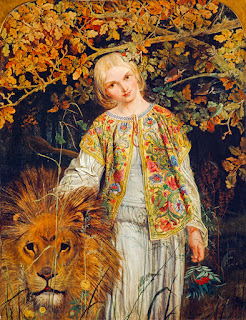
Faire Vna to the Redcrosse knight betrouthed is with ioy:

Soone as the terme of those six yeares shall cease, Ye then shall hither backe returne againe, The marriage to accomplish vowd betwixt you twain.
Ok so the Red Cross Knight can marry Una after six years.
In which him chaunced false Duessa meete, Mine onely foe, mine onely deadly dread, Who with her witchcraft and misseeming sweete, Inueigled him to follow her desires vnmeete.
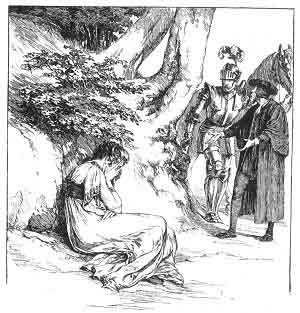
At last she chaunced by good hap to meet A goodly knight, faire marching by the way Together with his Squire, arayed meet
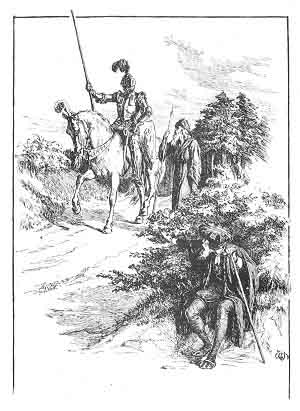
And to the knight his daughter deare he tyde, With sacred rites and vowes for euer to abyde. His owne two hands the holy knots did knit, That none but death for euer can deuide
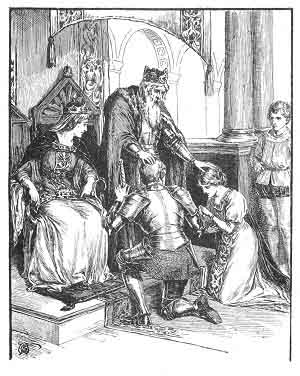
From thence, far off he vnto him did shew A litle path, that was both steepe and long, Which to a goodly Citie led his vew; Whose wals and towres were builded high and strong Of perle and precious stone, that earthly tong Cannot describe, nor wit of man can tell
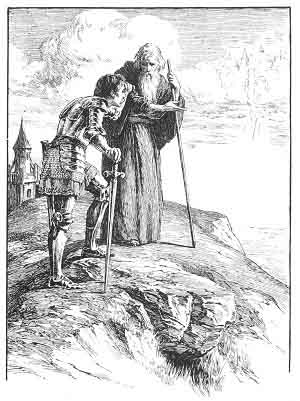
The knight and Vna entring, faire her greet, And bid her ioy of that her happie brood; Who them requites with court’sies seeming meet, And entertaines with friendly chearefull mood.
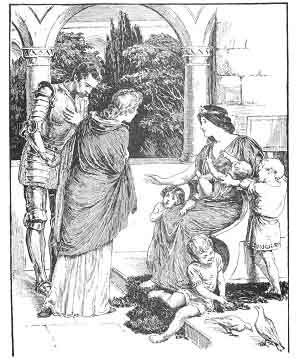
Ere long they come, where that same wicked wight His dwelling has, low in an hollow caue, Farre vnderneath a craggie clift ypight, Darke, dolefull, drearie, like a greedie graue, That still for carrion carcases doth craue
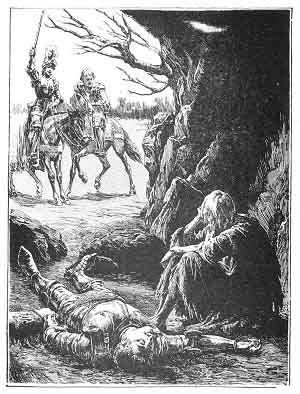
So as they traueild, lo they gan espy An armed knight towards them gallop fast, That seemed from some feared foe to fly, Or other griesly thing, that him agast.
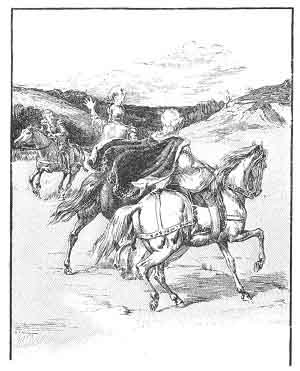
Whom when his Lady saw, to him she ran With hasty ioy: to see him made her glad, And sad to view his visage pale and wan
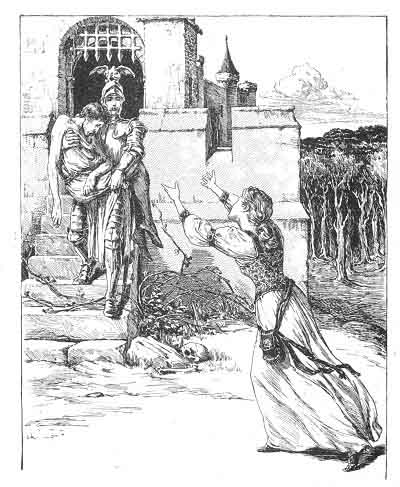
The knight approching nigh, of him inquerd Tydings of warre, and of aduentures new
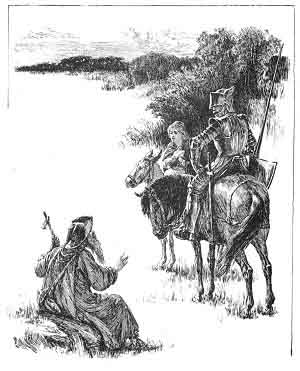
Lo vnderneath her scornefull feete, was layne A dreadfull Dragon with an hideous trayne, And in her hand she held a mirrhour bright, Wherein her face she often vewed fayne, And in her selfe-lou’d semblance tooke delight
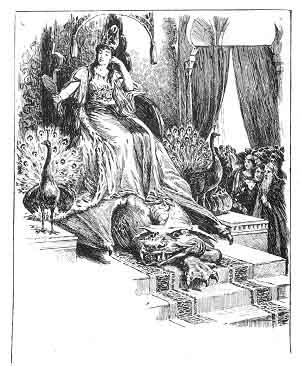
But this was drawne of six vnequall beasts, On which her six sage Counsellours did ryde,
Her carriage is pulled by six beasts on which her six advisors ride.
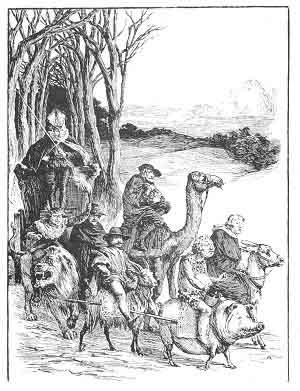
And proud Lucifera men did her call, That made her selfe a Queene, and crownd to be, Yet rightfull kingdome she had none at all,
She's made herself a queen, even though she isn't royal by birth and doesn't actually own any territory.
Her seeming dead he found with feigned feare, As all vnweeting of that well she knew, And paynd himselfe with busie care to reare Her out of carelesse swowne. Her eylids blew And dimmed sight with pale and deadly hew At last she vp gan lift: with trembling cheare Her vp he tooke, too simple and too trew, And oft her kist. At length all passed feare, He set her on her steede, and forward forth did beare.
They had sex?
Who whiles he liu’de, was called proud Sans foy, The eldest of three brethren, all three bred Of one bad sire, whose youngest is Sans ioy, And twixt them both was borne the bloudy bold Sans loy.
So his name is Sans foy, the eldest, the youngest is named Sans joy, and the middle brother is named Sans loy.
Borne the sole daughter of an Emperour, He that the wide West vnder his rule has, And high hath set his throne, where Tiberis doth pas. He in the first flowre of my freshest age, Betrothed me vnto the onely haire Of a most mighty king, most rich and sage; Was neuer Prince so faithfull and so faire, Was neuer Prince so meeke and debonaire; But ere my hoped day of spousall shone, My dearest Lord fell from high honours staire, Into the hands of his accursed fone, And cruelly was slaine, that shall I euer mone.
She says she's the daughter of an Emperor and that she's engaged to a prince but he died.
He then deuisde himselfe how to disguise; For by his mightie science he could take As many formes and shapes in seeming wise, As euer Proteus to himselfe could make: Sometime a fowle, sometime a fish in lake, Now like a foxe, now like a dragon fell, That of himselfe he oft for feare would quake, And oft would flie away. O who can tell The hidden power of herbes, and might of Magicke spell?
Archimago disguise himself as the Red Cross Knight! Oh my!
And after him she rode with so much speede As her slow beast could make; but all in vaine
They probably can't catch the Red Cross Knight and her drawf as they're too slow.
All in amaze he suddenly vp start With sword in hand, and with the old man went; Who soone him brought into a secret part, Where that false couple were full closely ment In wanton lust and lewd embracement: Which when he saw, he burnt with gealous fire, The eye of reason was with rage yblent, And would haue slaine them in his furious ire, But hardly was restreined of that aged sire.
The Red Cross Knight is mad and follows the magician to see "Una" sleeping with someone else. He wants to kill "that guy."
Forthwith he runnes with feigned faithfull hast Vnto his guest, who after troublous sights And dreames, gan now to take more sound repast, Whom suddenly he wakes with fearefull frights, As one aghast with feends or damned sprights, And to him cals, Rise rise vnhappy Swaine, That here wex old in sleepe, whiles wicked wights Haue knit themselues in Venus shamefull chaine; Come see, where your false Lady doth her honour staine.
Archimago decides to make one of his other spirits look like a young knight, and has the spirit that looks like Una get in bed with him.
KNIGHT OF THE RED CROSSE
aka. The Red Cross Knight, aka. St. George, the patron saint of England, who stands for the virtue of Holiness.
turnd
returned
to you bound
correcting her address to him as her "liege Lord"
beguiled of her art
being disappointed in her intent; or deprived of her cunning
appease
ceased, as though satisfied
procure
cause
irkesome
tired; also troublesome
vnknowne
unknown to her, but suggesting that he is unknown and unproven, and hence unworthy to be her lover
disdainefull spight
indignant contempt
redoubted
dreaded
deare
dire, but also the usual sense because of her love
frayes
frightens
languor
woeful plight, sorrow
rew
feel sorry for
Die is my dew
I deserve to die.
amate
dismay
that false winged boy
Cupid
the blind God
Cupid, "that false winged boy"
Tho can
then did
despight
indignation
vncouth
strange; unseemly
seruice
as the "servant" of love
toy
lustful play
Dame pleasures
Venus
vsage sly
refers to the cunning behavior by which she imitates Una
hew
shape, appearance
In sort as
in the way that
ydle
empty
Vna
The Lady is named only now, aka. Una.
sent
senses
fancies
fantasies
dryer
too dry
paine
effort
rudely
roughly
swowne
an earlier spelling of "swoon"
doth steepe
continually bathes
Cynthia
goddess of the moon; refers to the moon here
euer damned
eternally damned
Cocytus
the river of lamentation in Hades
quakes
because even wailing ceases
sad humour
heavy moisture
For that old man of pleasing wordes had store, And well could file his tongue as smooth as glas; He told of Saintes and Popes, and euermore He strowd an Aue-Mary after and before.
Is the old man a magician or something?
edifyde
built
forwearied
utterly wearied
Now (sayd the Lady) draweth toward night, And well I wote, that of your later fight Ye all forwearied be: for what so strong, But wanting rest will also want of might?
Her words are ironic--night doesn't bring rest but only his fight from her.
weare
spend
mell
concern himself
sits not
isn't fitting
straunge
out of the country
louting
bowing humbly
malice
wickedness
in shew
in appearance
his booke
probably his Bible
An aged Sire
identified as Hypocrisie
to frend
as a friend
vnkindly Impes
unnatural offspring
amazde,
stunned
remorse
pity
raft
struck off
lin
cease
ill bestedd
in bad plight
blacke as inke
This is linked with the books and papers in Errour's poisonous vomit.
sinke
her womb
seed
semen
outwell
pour forth
auale
abate
parbreake
vomit
His Ladie seeing all, that chaunst, from farre Approcht in hast to greet his victorie, And said, Faire knight, borne vnder happy starre, Who see your vanquisht foes before you lye: Well worthy be you of that Armorie,
The Lady sees everything and says to the Knight that he has shown himself to be worthy of armor.
Deuoure their dam; on whom while so he gazd, Hauing all satisfide their bloudy thurst, Their bellies swolne he saw with fulnesse burst, And bowels gushing forth: well worthy end Of such as drunke her life, the which them nurst; Now needeth him no lenger labour spend, His foes haue slaine themselues, with whom he should contend.
These little monsters kill themselves without his help and he is happy to see them die.
That detestable sight him much amazde,
Even the Red Cross Knight feels grossed out by this scene.
And sucked vp their dying mothers blood, Making her death their life, and eke her hurt their good
Ugh! Seeing their mother dies, the monster babies sucking up her blood... Do they actually kill their mom by doing that?
gobbets raw
chunks of undigested food
paine
his effort leads to her pain
griefe
anger
gall
the source of anger
Cride out, Now now Sir knight, shew what ye bee,
That's Vna, the lady's cry.
constraint
distress
God helpe the man so wrapt in Errours endlesse traine.
Only God can help the knight!
traine
treachery, deceit
Tho
then
traine
tail, suggesting all that follows Errour
gathered round
coiled